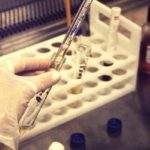1. Comprehensive genetic testing for cardiomyopathy and arrhythmia diagnoses improved the ability to detect underlying conditions which may have otherwise not been detected.
2. Combined genetic prognostic information also assisted patients and families in shared decision-making.
Level of Evidence Rating: 2 (Good)
Study Rundown: Patients diagnosed with nonischemic cardiomyopathies and inherited arrhythmias are recommended to undergo genetic testing for the purpose of revealing prognostic information and aiding in shared decision-making. However, patients are often not offered genetic testing due to resource limitations, a lack of awareness about this resource, or concerns about potential false-positive results. The present study sought to describe the diagnostic yield and clinical impacts of multi-disease genetic testing for patients with nonischemic cardiomyopathy and/or inherited arrhythmias and their family members.
4782 unrelated patients were referred to genetic services for testing throughout the study period. 89.3% of patients were referred for personal suspicion of a relevant genetic condition and 10.7% were referred based on family history alone. 1227 pathogenic or likely pathogenic variants were found overall, and 954 (19.9%) patients went on to receive a molecular diagnosis. 0.8% of patients tested positive for both an arrhythmia and cardiomyopathy condition. Combined testing was compared with the diagnostic yield of testing practices recommended by the American Heart Association in which only high-risk patients received testing. In this situation, 14.4% of patients with positive diagnoses would have been missed. Of the patients with a positive diagnosis, 1 in 5 individuals had clinically significant disease and 6% of positive results had a targeted molecular therapy available.
The present study by Dellefave-Castillo demonstrated that performing combined genetic testing for both nonischemic cardiomyopathy and inherited arrhythmias increases the diagnostic yield compared to standard clinical practices. The results of this study should encourage clinicians to make use of referral services for genetic testing when indicated for a range of potentially heritable cardiac disorders. Strengths of this work include the large sample size and comprehensive analysis. However, this study is not pragmatic as genetic testing was financially covered whereas insurance coverage may vary widely in a true-world setting. Overall, this work demonstrated that the benefits of combined genetic testing outweigh the drawbacks as many patients and family members had access to empowering diagnostic information.
Click here to read this study in JAMA
Click to read an accompanying editorial in JAMA
Relevant reading: Genetic testing for inherited cardiac disease
In Depth [prospective cohort]: A multi-center, prospective cohort study was conducted in the United States and Canada. Clinicians were asked to identify patients suspected of having nonischemic cardiomyopathy and/or an inherited arrhythmia, as well as their rationale for inclusion (i.e., known diagnosis, pertinent family history of heritable cardiac disease, sudden cardiac death or postmortem diagnosis of heritable cardiac disease). Genetic testing in the form of next-generation sequencing gene panels was performed using standard methods. The interpretation of genetic results was performed by Sherloc software which assigned findings as pathogenic, likely pathogenic, benign, likely benign or of uncertain significance using criteria defined by guiding genetic institutions and current literature. Diagnostic yield was calculated based on the percentage of true positive cases out of those who clinicians had referred for testing.
The diagnostic yield for patients with a personal indication for testing was 20.3%; this value varied amongst the subset of conditions detected with young adults worked up for hypertrophic cardiomyopathy having the highest yield of 40.4%. The overall diagnostic yield for a single cardiomyopathy subtype was 25.4% and 26.7% for multiple cardiomyopathy subtypes. 21.1% of suspected arrhythmia cases had a positive diagnosis. The p-value for the overall diagnostic yield was 0.02, indicating significance. A total of 958 family members underwent diagnostic testing and 42.0% of individuals received a positive result. 4.5% of diagnoses would have been missed when combined testing was compared with standard practices.
Image: PD
©2022 2 Minute Medicine, Inc. All rights reserved. No works may be reproduced without expressed written consent from 2 Minute Medicine, Inc. Inquire about licensing here. No article should be construed as medical advice and is not intended as such by the authors or by 2 Minute Medicine, Inc.


